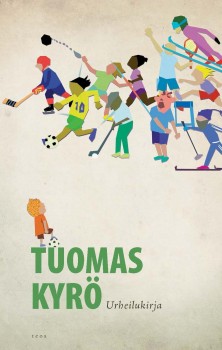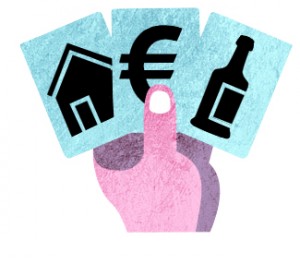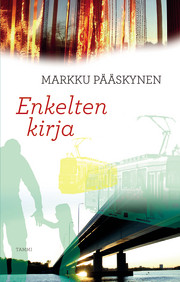An abridged version of this essay has been published at Books from Finland.
I am a professional translator, and I have a secret: I don’t read translations. Shocked? Don’t be.
I’m not alone. The literary website Three Percent draws its name from the fact that only about 3 % of books published in the United States are translations (the figure for Germany is apparently something like 50 %). There are various opinions about why this is, including this one from Three Percent’s Chad Post writing at Publishing Perspectives. I’ll get to my own explanation in a moment.
Why do I say it’s a secret that I don’t read translations? Because people expect me to read translations, as if as a translator it were my sacred duty to show solidarity with my professional community. Or maybe I can’t be cosmopolitan otherwise. Americans are just a bunch of xenophobic boors anyway, right? If you like that explanation, I hope it keeps you warm at night. In most industries, if the boys in marketing fail to reach a major target audience, they get kicked to the gutter. But if it makes you feel better to blame the consumer, be my guest.
Here’s the cold, hard truth: there are some 350 million native English speakers in the world, most of whom live in the United States. The US is the equivalent of 60 Finlands in terms of population. Among those 350 million English speakers there are a lot of writers. And while for a very few readers translated literature is a category unto itself, for most of us translated literature is competing with everything else on the fiction shelves. If a translation doesn’t get read widely (and most don’t), the translated book itself (a new work being presented in a new context) has failed to appeal to a publisher enough for them to spend money marketing it and failed to appeal to an audience enough for them to finish the book and then recommend it to a friend.
Ok, so why don’t translations usually compete well? I don’t think it’s any mystery. In a really, really good book, the concepts and events being described run together with the language being used to describe them. The concepts the author imagines influence the choices made in the language, and the language the author conjures influences the choices of concept. And I’m not talking just at the novel level. I mean from sentence to sentence and word to word.
In genre fiction, the concepts (i.e. the “action”) are most important, so the language is more functional than poetic, which is part of why some literati turn their noses up at it. Genre literature generally translates well. In art fiction, there is more balance, sometimes even with the how of the expression becoming more important than the what. This is extremely difficult to translate, especially given the cult of “faithfulness” among translators. Even though I know what the author just described, I can’t just restate it, since he also made sure every other word in the sentence started with the same letter (just to choose a common device from Finnish). How often do you think that sort of thing can be replicated in another language? In a language from a completely different language family (Finnish is non-Indo-European)? Not often.
So with art fiction, right out of the gate you can assume that a big part of what made the book a success is going to be lost. Just think about it. Does anyone get turned off from translated literature by a Henning Mankell? No. It’s usually a Kafka or Marquez that was challenging enough in the original, but made absolutely incomprehensible in translation. (Luckily for big names like those, a new translation usually comes along.) We read Mankell for the puzzle—the language just has to not get in the way. We read Marquez for both the story and the language.
Take how many people have had a bad experience with a translation that made the foreign seem alien, add the language barriers between foreign books and domestic agents and publishers, and then put this in the context of stiff domestic competition, and you get only 3 % of books published in the US being translations.
The ironic thing about the 3 % figure is how tremendously important translated literature is to the Anglo-American literary consciousness. Ask anyone who paid attention in high school who the greatest authors of all time are, and you’re almost certain to get at least two Russians, a Frenchman or two, a Spaniard, two Chileans, and a Brazilian, plus an ancient Greek or three.
Despite my dirty little secret, my favorite book is a translation. When I was eighteen years old, I read Narcissus and Goldmund, by Hermann Hesse. I’m not one for rereading books, but this has been an exception. However, and with all due respect to the English language translator, Ursule Molinaro (and whoever her editor was), even as a teenager, and without any reference to the source German text, I knew the translation wasn’t the best it could be. But note, this is my favorite book, so whatever deficiencies there are in the translation or with the original work, the virtues of both far outweigh them for me. And let me tell you, the problems with Narcissus and Goldmund (and with every other conscientious translation in the history of the world) are child’s play compared to some of what I’ve seen lately.
Remember what we’re talking about though: one of the most beloved books by a Nobel Prize winner who explored the same themes over and over, honing his conceptual expression, written at the height of his career. What happens to the average book that ends up in a translation in which an eighteen-year-old can see deficiencies?
I can tell you what happens to it in my case: it doesn’t get read. I read a paragraph, I start editing the grammar and punctuation in my mind, perhaps rephrasing the dialogue, and I get bored. Whatever great concepts or action there might be in the book, if the language is sub-par, I’m never going to get far enough to find out. There’s just too much good literature (and other things) out there to waste my time. No book is ever perfect, but at the very, very least the language needs to not get in the way of whatever might be interesting otherwise about the book.
One of the most basic standards in professional translation is that translators only translate into their native language. Brain development changes after age 12; if you don’t learn a language before that point, you aren’t a native speaker. Taking me as an example, Finnish and Estonian are second languages for me, so I translation from these languages into English. If someone asks me to translate the other direction, I say no.
The reason should be pretty obvious: even if a translator were to misunderstand something in the original, if he can express what he understood in a fluent, interesting way, the reader will almost certainly never know or care there had been a misunderstanding. Reading is always an act of interpretation after all. But if the language is odd, the reader knows immediately.
What do I mean by odd language? I mean teenagers whose speech makes them sound 50 years old. I mean book after book narrated in the present tense, which is rare and usually awkward in English. I mean non-English punctuation, particularly comma splices. I mean non-English expressions like “open the television” resulting from literal translation. I could go on.
The basic remedies for these types of problems are professional-level fluency and proofreading.
Fluency is, like most human attributes, a result of innate ability, training, and maintenance. The professional translator presumably already has the first two, but maintaining fluency can be devilishly tricky. Does that seem odd?
Consider the path a (Finnish) translator walks to arrive at his profession. First comes a connection to Finland, one that surprisingly often comes either by chance or fate, depending on one’s cosmology. Then comes what we might call an infatuation: the nascent translator becomes obsessed with Finnish language and culture, which leads to improved language skills and literary awareness. By the time the literary translator really breaks into the profession, his Finland hobby has likely been going on for a decade. If the translator works with Finnish literature by day professionally, and then continues to read Finnish literature, follow Finnish news, and keep up with Finnish friends during his free time out of old habit, how current is he likely to stay with literature in his native language? Taking myself as an example, I know exactly what’s going on in Finnish literature right now, but I haven’t really the slightest idea about what’s going on in American literature, other than some guy named Franzen is hot. Peter? Oh, no, Jonathan. Peter is the Finnish actor. See what I mean?
So why is a failure to stay current with my native language literature a problem? Because my job, the entire point of my profession, is to produce good English. This is what translation is: rewriting a book from another language in your own. The author takes care of the plot and the Finnish, and I’m supposed to take care of the English. Reading Finnish doesn’t help with that. Reading other translators’ work probably won’t help either, and may even hurt. However, every word of English-language literature I read can improve my ability to manipulate the English language in the way that Finnish authors manipulate Finnish. To my mind, reading in his own language should be a literary translator’s primary professional development activity. And when I say read, I don’t just mean read, I mean read and pay attention. The basic mechanics of fluent expression are surprisingly easy to lose one’s grasp on, especially when constantly immersed in a foreign set of mechanics. Remember the comma splices—Finnish uses commas differently than English, and translators forget.
Finally, the translator’s lifeline. The importance of professional proofreading and editing cannot be overstated. Publishing translations without multiple reviews by native linguistic experts is professional suicide for everyone whose name is on the title page. The same is true of written materials used to promote translated literature. A publisher or agent who sends out material without multiple reviews by native linguistic professionals doesn’t want to make money (sample translations and promotional materials should be top quality, not an afterthought—see this post by Emily Williams ).
Literature in translation can and does compete with native literature, even in demanding markets. I don’t expect to see any “breakthrough” that permanently changes the 3 % figure cited above, but that doesn’t mean translated literature has failed to find a readership. It just means that there is a lot of competition and that every book succeeds or fails on its merits, not on the reputation of the overall field. Whatever momentum one big hit may create is likely to be short-lived. Yes, there are aspects of the book trade that make breaking in difficult, but every new author faces these challenges. Perhaps the greatest disservice any of us involved in translation can do is to adopt a sort exceptionalist attitude, as if the success of a book or author in Finland (or wherever) should give the book a free pass from all of the normal requirements for finding a publisher and an audience. Hype will only get you so far.
Last week I perused the shelves at a local big box store, which only sells best-sellers. I was pleased with how many translations there were; definitely more than 3 % of the fiction. But in every case there was something odd. One book pretended not to be a translation. In another the translator’s name was buried in the copyright page. The third, fourth, and fifth we’ve all heard about. Despite the heroic efforts of thousands of translators over the years at an impossible task, often working at a pittance, there have been enough problems to convince publishers here that they have to be wary of translations.
The beginning of this essay is a lie. I do read translations. I want to read translations. But you, the translator, and I, the translator, must understand that I like television and films and music and my bicycle and my garden and my dog as much as I like books. I like my wife and my children and my church even more. I read the books I’m supposed to in order to be literate, but I also read science fiction and fantasy and espionage.* I’m not a captive audience. You have to win me over. Please win me over. You can’t say the Finnish or German or Chinese or whatever made you do it. You have to be a translator. Take responsibility. Win me over.
*But not nonfiction. Too far-fetched for my tastes. I do look at the pictures though.

























